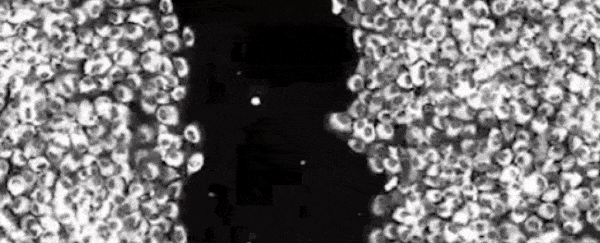We often think of sleep at night as a restorative function: a vital quiet time that recharges and mends our bodies. And it is, but perhaps not quite the way we imagine.
In fact, recent research shows that when it comes to wound healing, our bodies actually heal significantly faster if the injury is sustained during the day rather than at night, because of the way circadian rhythms control how cells function.
It used to be thought that circadian rhythms were controlled solely by the 'master clock' of the brain's hypothalamus, but scientists now think biological time-keeping extends throughout all the cells in the body.
Quite how this works is complex and is still being explored, but there's no denying these mechanisms can have powerful repercussions – like repairing damaged tissue at a dramatically different rate, depending on the time of day you get injured.
To investigate this, in 2017 researchers at Cambridge University examined how skin cells called fibroblasts respond differently, depending on what time of day it is.
When we become wounded, these fibroblast cells migrate to the affected area and produce restorative proteins such as collagen that help rebuild damaged tissue.
But these first responders depend upon a protein called actin to do their job, and when there isn't enough actin, fibroblast motility is impaired.
As it happens, what determines the levels of actin is circadian timing. Just like you and me, these skin cells are slaves to the day-night cycle.
To examine how this works, the researchers examined fibroblast cultures grown in petri dishes. When the cultures were scratched at different times, the wounds sustained in simulated 'night' conditions healed more slowly than those during the day, due to differing speeds of fibroblast response.
"This is consistent with the migratory capacity of cells, adjacent to a nascent wound, being determined by the actin dynamical state at the circadian phase when the wound is incurred," the authors explain.
Experiments with live mice showed the same phenomenon, with the animals healing quicker if a cut was sustained during their waking hours than if it were imposed when they would ordinarily have been asleep.
"We consistently see about a two-fold difference in wound healing speed between the body clock's day and night," explained senior author and molecular biologist John O'Neill, who also pointed out that these responses can be manipulated.
"In both cells and mice, we can reset the tissue healing response by tricking the cells into thinking it's a different time of day – such as by turning the lights on at night and off at different times of day for the mice, or using body clock-altering drugs on cells in the lab."
These kinds of techniques could have a potentially huge effect in medical treatments, researchers think, enabling surgeons to tailor operations to times when patients might respond best.
That's important, because the research also suggests the same thing is going on in human patients.
When the team analysed clinical data from patients who had received burn injuries, they found a stunning differentiator in treatment outcomes.
Burns sustained at night (defined as 8 pm–8 am) took on average about 60 percent longer to effectively heal than the same kinds of injuries sustained during the day: 28 days for night burns, compared to just 17 days for burns received between 8 am and 8 pm.
That's a big gap, and it's something that could potentially lead to new kinds of medical treatments centred around the science of circadian rhythms.
"Not only could novel drug targets be identified, but also the effectiveness of established therapies might be increased through changing what time of day they are given," said one of the researchers, respiratory clinician John Blaikley from the University of Manchester.
As for why we heal more slowly at night, nobody can say for sure, although the researchers speculate it may be an evolutionary adaptation: we heal faster during the day, because that's when we are more likely to be active and become injured.
There's a lot more research to do before we can take advantage of this, but it's just the latest evidence of how fundamentally influential circadian biology is to our overall health, affecting not just our sleeping patterns, but also our appetite, state of mind, and behaviour too.
The findings were reported in Science Translational Medicine.
